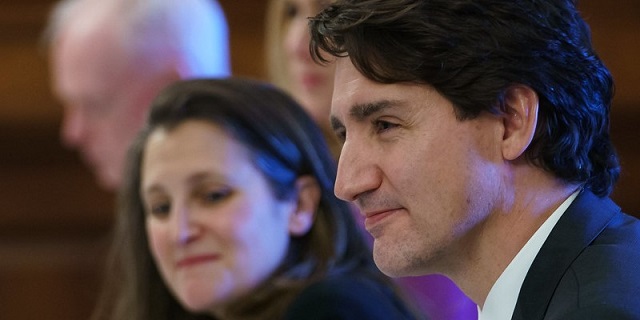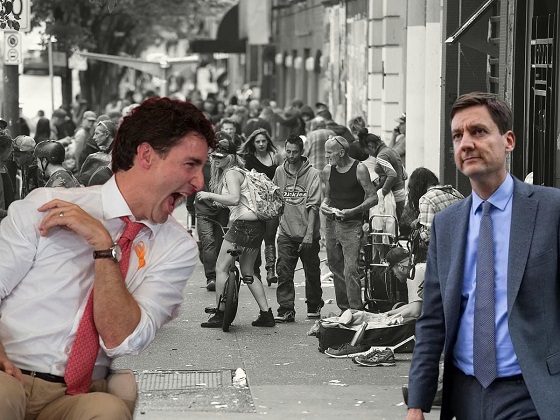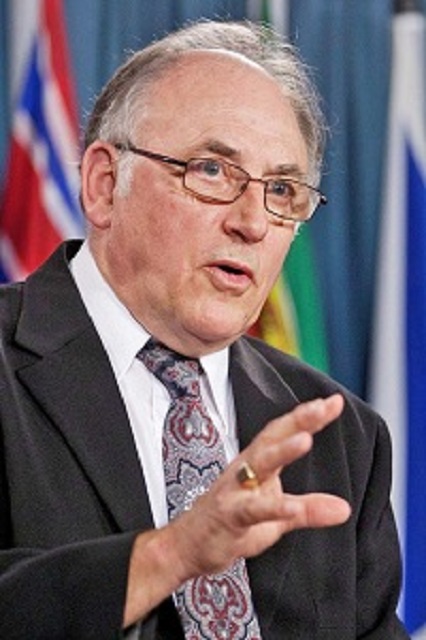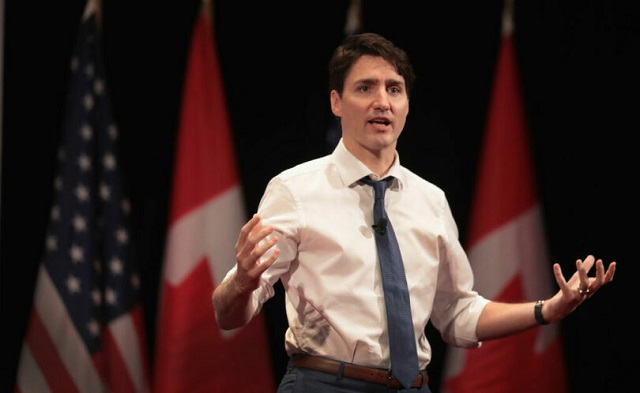Economy
Federal budget’s scale of spending and debt reveal a government lacking self-control

From the Fraser Institute
By Jake Fuss and Grady Munro
Had the government simply limited the growth in annual program spending to 0.3 per cent for two years, it could have balanced the budget by 2026/27 and avoided significant debt accumulation.
Instead, the government chose to increase annual program spending by an average of 4.4 per cent over the next two years and kick the debt problem down the road for another government to solve.
Time and time again, Prime Minister Justin Trudeau and Finance Minister Chrystia Freeland have emphasized the importance of being fiscally responsible with federal finances. Unfortunately, this year’s federal budget ensures once again their rhetoric rings hollow due to their ongoing mismanagement of federal finances.
This mismanagement is rooted in the government’s insatiable appetite for new and expanded programs or services, which has endured for nine years and will continue for the foreseeable future. The budget introduces billions of dollars in additional spending for a national school food program, housing initiatives and artificial intelligence. As such, program spending (total spending minus debt interest costs) is now expected to be $77.2 billion higher over the next four years than the government forecasted last spring.
In 2024/25 alone, federal program spending will reach a projected $483.6 billion—an increase of $16.1 billion compared to the previous budget’s estimates. On a per-person inflation-adjusted basis, federal program spending is forecasted to reach $11,901, which is approximately 28.0 per cent higher than during the final full year of Stephen Harper’s tenure as prime minister (2014/15). The Trudeau government has already recorded the five (2018 to 2022) highest levels of federal program spending per person in Canadian history (inflation-adjusted), and budget projections suggest it’s now on track to possess the eight highest levels of per-person spending by the end of its term next autumn.
This is despite recent polling data that shows the majority of Canadians (59 per cent) think the Trudeau government is spending too much. Nearly two-thirds (64 per cent) of Canadians are also concerned about the size of the federal deficit.
As it has done nine times before, the Trudeau government will borrow to fund some of its spending spree, resulting in a projected budget deficit of $39.8 billion this year, which is $4.8 billion higher than previously forecasted. And it doesn’t intend to stop borrowing, with annual deficits exceeding $20 billion planned for the subsequent four years. This represents a notable increase in deficits compared to what was expected in the last year’s budget. Simply put, there’s no plan for a return to balanced budgets any time soon. As a result, federal debt (net debt minus non-financial assets) is expected to climb $156.2 billion from now until April 2029.
To make matters worse, the government is also increasing the capital gains inclusion tax rate from 50.0 per cent to 66.6 per cent for capital gains realized above $250,000. This will act as a huge disincentive for individuals and businesses to invest in Canada at a time when the country already struggles to attract the very investment we need to improve productivity, economic growth and living standards. Businesses and individuals will now simply invest their capital elsewhere.
There’s a large body of research that finds low or no capital gains taxes increase the supply and lower the cost of capital for new and growing firms, leading to higher levels of entrepreneurship, economic growth and job creation—precisely what Canada needs more of today and in the future.
While the government did boast about its ability to hold the 2023/24 deficit at $40.0 billion, this had little to do with responsible fiscal management. Instead, the government enjoyed higher-than-anticipated revenues of $8.3 billion, but repeated its all too frequent and ill-advised approach of spending that money and wiping out any chance to reduce the deficit.
Growing federal debt leads to higher debt interest costs, all else equal, which eat up taxpayer dollars that could otherwise have provided services or tax relief for Canadians. For context, the government now spends more ($54.1 billion) on debt interest as on health-care transfers to the provinces ($52.1 billion). Accumulating debt today also increases the tax burden on future generations of Canadians who are ultimately responsible for paying off this debt. Research suggests this effect could be disproportionate, with future generations needing to pay back a dollar borrowed today with more than one dollar in future taxes.
But again, it didn’t have to be this way. As we pointed out before the budget, had the government simply limited the growth in annual program spending to 0.3 per cent for two years, it could have balanced the budget by 2026/27 and avoided significant debt accumulation.
Instead, the government chose to increase annual program spending by an average of 4.4 per cent over the next two years and kick the debt problem down the road for another government to solve. Simply put, the government’s fiscal strategy is not all that different from an overzealous child that eats all their Halloween candy in one night even though they fully understand it won’t end well.
Yet for all this spending and debt, living standards have not improved for Canadians. In fact, inflation-adjusted GDP per person was actually lower at the end of 2023 than it was nine years prior in 2014. And going forward, the OECD predicts Canada will record the lowest growth rates in per-person GDP up to 2060 of any industrialized country—meaning countries such as New Zealand, Italy, Korea, Turkey and Estonia would all surpass Canada with higher living standards.
The combination of tax hikes and scale of spending and debt in this year’s federal budget demonstrate the Trudeau government has no interest in being fiscally responsible or improving living standards for Canadians. Instead of showing restraint, the government chose to repeat its mistakes and lead federal finances down an increasingly perilous path.
Authors:
Business
Taxpayers criticize Trudeau and Ford for Honda deal

From the Canadian Taxpayers Federation
Author: Jay Goldberg
The Canadian Taxpayers Federation is criticizing the Trudeau and Ford governments to for giving $5 billion to the Honda Motor Company.
“The Trudeau and Ford governments are giving billions to yet another multinational corporation and leaving middle-class Canadians to pay for it,” said Jay Goldberg, CTF Ontario Director. “Prime Minister Justin Trudeau is sending small businesses bigger a bill with his capital gains tax hike and now he’s handing out billions more in corporate welfare to a huge multinational.
“This announcement is fundamentally unfair to taxpayers.”
The Trudeau government is giving Honda $2.5 billion. The Ford government announced an additional $2.5 billion subsidies for Honda.
The federal and provincial governments claim this new deal will create 1,000 new jobs, according to media reports. Even if that’s true, the handout will cost taxpayers $5 million per job. And according to Globe and Mail investigation, the government doesn’t even have a proper process in place to track whether promised jobs are actually created.
The Parliamentary Budget Officer has also called into question the government’s claims when it made similar multi-billion-dollar handouts to other multinational corporations.
“The break-even timeline for the $28.2 billion in production subsidies announced for Stellantis-LGES and Volkswagen is estimated to be 20 years, significantly longer than the government’s estimate of a payback within five years for Volkswagen,” wrote the Parliamentary Budget Officer said.
“If politicians want to grow the economy, they should cut taxes and red tape and cancel the corporate welfare,” said Franco Terrazzano, CTF Federal Director. “Just days ago, Trudeau said he wants the rich to pay more, so he should make rich multinational corporations pay for their own factories.”
Business
Maxime Bernier warns Canadians of Trudeau’s plan to implement WEF global tax regime

From LifeSiteNews
If ‘the idea of a global corporate tax becomes normalized, we may eventually see other agreements to impose other taxes, on carbon, airfare, or who knows what.’
People’s Party of Canada leader Maxime Bernier has warned that the Liberal government’s push for World Economic Forum (WEF) “Global Tax” scheme should concern Canadians.
According to Canada’s 2024 Budget, Prime Minister Justin Trudeau is working to pass the WEF’s Global Minimum Tax Act which will mandate that multinational companies pay a minimum tax rate of 15 percent.
“Canadians should be very concerned, for several reasons,” People’s Party leader Maxime Bernier told LifeSiteNews, in response to the proposal.
“First, the WEF is a globalist institution that actively campaigns for the establishment of a world government and for the adoption of socialist, authoritarian, and reactionary anti-growth policies across the world,” he explained. “Any proposal they make is very likely not in the interest of Canadians.”
“Second, this minimum tax on multinationals is a way to insidiously build support for a global harmonized tax regime that will lower tax competition between countries, and therefore ensure that taxes can stay higher everywhere,” he continued.
“Canada reaffirms its commitment to Pillar One and will continue to work diligently to finalize a multilateral treaty and bring the new system into effect as soon as a critical mass of countries is willing,” the budget stated.
“However, in view of consecutive delays internationally in implementing the multilateral treaty, Canada cannot continue to wait before taking action,” it continued.
The Trudeau government also announced it would be implementing “Pillar Two,” which aims to establish a global minimum corporate tax rate.
“Pillar Two of the plan is a global minimum tax regime to ensure that large multinational corporations are subject to a minimum effective tax rate of 15 per cent on their profits wherever they do business,” the Liberals explained.
“The federal government is moving ahead with legislation to implement the regime in Canada, following consultations last summer on draft legislative proposals for the new Global Minimum Tax Act,” it continued.
According to the budget, Trudeau promised to introduce the new legislation in Parliament soon.
The global tax was first proposed by Secretary-General of Amnesty International at the WEF meeting in Davos this January.
“Let’s start taxing carbon…[but] not just carbon tax,” the head of Amnesty International, Agnes Callamard, said during a panel discussion.
According to the WEF, the tax, proposed by the Organization for Economic Co-operation and Development (OECD), “imposes a minimum effective rate of 15% on corporate profits.”
Following the meeting, 140 countries, including Canada, pledged to impose the tax.
While a tax on large corporations does not necessarily sound unethical, implementing a global tax appears to be just the first step in the WEF’s globalization plan by undermining the sovereignty of nations.
While Bernier explained that multinationals should pay taxes, he argued it is the role of each country to determine what those taxes are.
“The logic of pressuring countries with low taxes to raise them is that it lessens fiscal competition and makes it then less costly and easier for countries with higher taxes to keep them high,” he said.
Bernier pointed out that competition is good since it “forces everyone to get better and more efficient.”
“In the end, we all end up paying for taxes, even those paid by multinationals, as it causes them to raise prices and transfer the cost of taxes to consumers,” he warned.
Bernier further explained that the new tax could be a first step “toward the implementation of global taxes by the United Nations or some of its agencies, with the cooperation of globalist governments like Trudeau’s willing to cede our sovereignty to these international organizations.”
“Just like ‘temporary taxes’ (like the income tax adopted during WWI) tend to become permanent, ‘minimum taxes’ tend to be raised,” he warned. “And if the idea of a global corporate tax becomes normalized, we may eventually see other agreements to impose other taxes, on carbon, airfare, or who knows what.”
Trudeau’s involvement in the WEF’s plan should not be surprising considering his current environmental goals – which are in lockstep with the United Nations’ 2030 Agenda for Sustainable Development – which include the phasing out coal-fired power plants, reducing fertilizer usage, and curbing natural gas use over the coming decades.
The reduction and eventual elimination of so-called “fossil fuels” and a transition to unreliable “green” energy has also been pushed by the World Economic Forum – the aforementioned group famous for its socialist “Great Reset” agenda – in which Trudeau and some of his cabinet are involved.
-

 Censorship Industrial Complex1 day ago
Censorship Industrial Complex1 day agoNow We Are Supposed to Cheer Government Surveillance?
-

 Alberta1 day ago
Alberta1 day agoRed Deer Doctor critical of Alberta’s COVID response to submit report to Danielle Smith this May
-

 conflict2 days ago
conflict2 days agoCol. Douglas Macgregor torches Trump over support for bill funding wars in Ukraine and Israel
-

 Alberta1 day ago
Alberta1 day agoAlberta’s baby name superstar steals the show again
-

 Uncategorized1 day ago
Uncategorized1 day agoThe end of Canada: The shift from democracy to totalitarian behavior in the ‘pandemic era’
-

 Business15 hours ago
Business15 hours agoDon’t be fooled by high-speed rail
-

 Alberta14 hours ago
Alberta14 hours agoActivity-Based Hospital Funding in Alberta: Insights from Quebec and Australia
-

 Business2 days ago
Business2 days agoFederal government’s ‘fudget budget’ relies on fanciful assumptions of productivity growth








